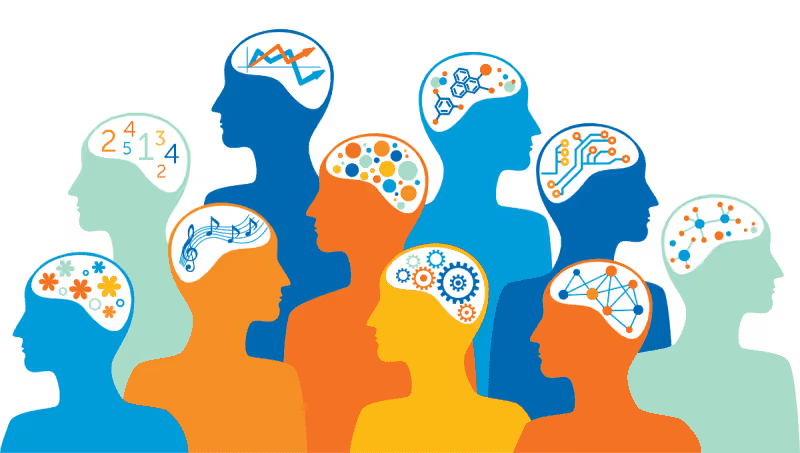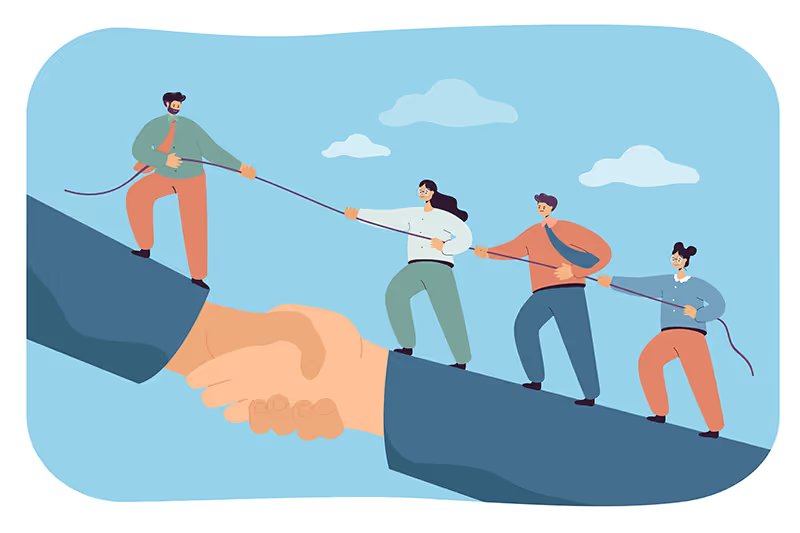Drew Herrema has a keen eye for design and an uncanny ability to conceptualize how aspects of a project are intertwined, but due to restrictive hiring practices, such as the importance placed on writing skills and quick thinking, he has been unable to land a job. Nasceda Blake made it through the hiring process, but she experienced burnout on the job because of the increased energy it took to exist in a workplace designed for neurotypical individuals. And before finding a neuro-inclusive workplace where she is now thriving, Khushboo Chabria had been let go twice due to difficulties adapting to inflexible workplace expectations that were created without neurodiversity in mind.
These stories are not uncommon amongst neurodivergent individuals. It’s estimated that between 15 and 20% of people are neurodivergent, meaning, as Blake explains, “A lot of people are missing out, or are being excluded, or are more likely to quit, just purely based on the normal structure of work and what is deemed to be professional and good practice.”
To learn more about how to make workplaces more neuro-inclusive, we sat down with Herrema, Blake, and Chabria. Here are some of their suggestions for how to create more neuro-inclusive hiring practices and workplace cultures.
Take the time to understand what neurodiversity means
[‘Neurodiversity’] is a bit of a buzzword. But if we’re going back to the core of it, it’s a sociological concept that describes the world as being made up of individual brains. No two brains are the same, so that means neurotypical brains are different to autistic brains, to ADHD brains, to Tourette’s brains, to brains with mental illness, to brains with learning disabilities.
Neurodiversity encompasses our world. It doesn’t place value on particular conditions. The medical model talks a lot about deficits in comparison to ‘normal’ people, being unable to do this or unable to do that. Neurodiversity allows us to explain things as being a natural variation, which is far more accepting, more inclusive, and creates more positive talk around these kinds of topics. Understanding neurodiversity means that you’re going to be able to reach more people, understand more people, and retain more people.
– Nesceda Blake, Freelance Producer and Neurodiversity Advocate
Be intentional in your inclusion efforts
Awareness is great, but unless you’re creating that culture of psychological safety for everyone—not just neurodiverse people—then don’t hire diverse people. You have to change the culture from the inside out. You have to be willing to look at everything and turn everything upside down to make it work.
We [want to] make sure that you don’t create a culture where anyone feels othered. They’re integrated into the organization’s community. They’re involved in different things that are going on within the organization. They have the support that they need. They feel they can bring new ideas, they can speak up, they can share, and they can disclose their diagnosis. I mean, that’s just top level.
Also, awareness doesn’t just start and stop with one session. Just like with everything else, you have to keep it up to date. If you have a manager who’s trained in neurodiversity awareness and they leave and there’s a new manager who knows nothing about neurodiversity, you’ve failed.
– Khushboo Chabria, Diversity & Inclusion Program Manager, Neurodiversity Pathways
Provide options for everyone
Instead of requiring requests for accommodations, provide options for everyone. For example, if you need tech support, you can email, you can chat, you can call, and, in some cases, you can go in person. But you don’t have those options when you’re trying to apply for a position. So for the hiring process, it’s not that you need to request accommodations, it’s that you have these different options. That helps everyone.
Having options also means that there are less barriers to get help. Say you want to try a screen reader or a text-to-speech or some other assistive technology. If it’s an option, then you can just try it out and if it helps, it helps, and if it doesn’t, it doesn’t. But if you have to request an accommodation, it becomes a process and now there’s a label attached. You can’t just casually try it. Having options would create a culture where everyone has different needs. They’re not special needs, they’re needs.
– Drew Herrema, UX/Service Designer
Adjust your hiring process
The hiring process is to determine whether a person has the skills to do the job, but there’s a lot of rigidity and many of the tasks that are required to get the job don’t apply to the actual job itself. For most interviews, you need to brag about yourself and how what you’ve done benefited everyone. But usually you don’t brag about yourself in the job, and in most cases, you’re working with other people so it’s just not what you’ve done, it’s your team working together. Working is a team sport and the job search is a solo sport, but you have to be good at the solo sport to get on the team.
A lot of job interviews require quick responses, but you don’t always want people who just say the first thing that comes to their mind. You want people who also can sit back, think, and then give a more thought-out, thorough answer.
Interviews don’t always relate to the actual skills that are required for the position. There are a lot of jobs where you actually don’t have to talk to people, but part of the interview process is still talking to humans face-to-face and having to make eye contact. Eye contact is only important because it’s socially expected. If you can’t force yourself to maintain eye contact, you’re at a disadvantage compared to someone else. So if you have two equally qualified people but one person has to focus on making eye contact, half of their energy is spent on just trying to do that.
If you’re trying to fix the hiring process and you’re only looking at people who are in the company to help, then you’re only including the people who succeeded past the barriers so you’re not seeing what the barriers are. You need to hire people who weren’t able to proceed to show how to fix it. It’s a hard challenge to find the users who are trying to get in but can’t. But you don’t know what you don’t know so you can’t fix it unless you ask.
– Drew Herrema
Interviews are a test of how you respond on the fly and how you handle things under pressure, but there are ways to show that that aren’t a quiz of someone’s social and communication skills. Providing the questions in advance allows candidates to prepare. Interviews shouldn’t be a test of your memory or recall. We should want people to succeed, and having these hurdles to jump over excludes not only neurodivergent people, but people who are just not as confident, or maybe more introverted, or maybe just have a lot on their plate.
– Nesceda Blake
Cater your management style to the needs of each employee
“The reason we are disabled is because there are barriers in society that limit us from accessing things that other people can access quite easily. Creating a standard of working that accommodates and understands everyone’s individual working needs, modes, and preferences is inclusive of neurodivergent people. So if someone doesn’t like last-minute meetings sprung on them, instead of saying “Hey, can we have a chat? I need to talk to you,” say, “Can we have a quick chat about X topic?”
– Nesceda Blake
My manager is such a neuro-inclusive leader. He’s good at reminding me of the structures that are in place and why we do things a certain way. He understands I’m a visual learner so I need him to model things for me rather than just tell me or put them in an email, because that’s not something that I can focus on. He understands that we need downtime between meetings. Between teaching a class and being on a networking call, it’s hard to code-switch right away, so we don’t schedule too many things in a small block of time.
It’s things like that [that are important]; having norms and expectations around emails, around scheduling, around feedback, around how you learn best, what mode of communication works best for you, and what kind of feedback you’re looking for. There are a lot of considerations that every manager should think about. We’re all unique. And we can all display neurodivergent tendencies sometimes. If you’re the only woman in a group of men, you’re going to behave differently. If you’ve just had a loss in your family, you’re going to behave differently. If you’re still moving and living in a pile of boxes, you’re not going to be the same at work.
– Khushboo Chabria




.avif)



